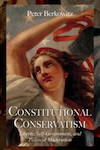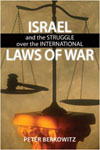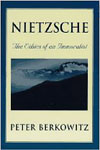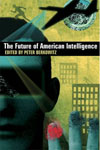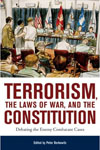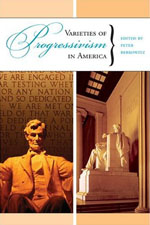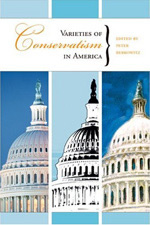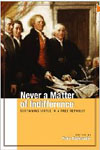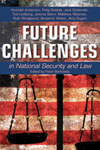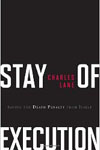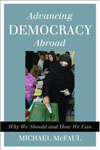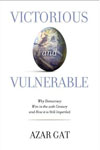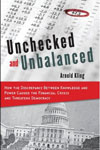Real Clear Politics, Aug. 16, 2014
Leo Strauss's Political Philosophy: Reviled But Redeemed
A review of Leo Strauss and the Problem of Political Philosophy by Michael P. Zuckert and Catherine H. Zuckert
University of Chicago Press. 416 pp.
“Always assume that there is one silent student in your class who is by far superior to you in head and in heart.” This is the counsel Leo Strauss, among the most consequential teachers and scholars of political philosophy in the 20th century, offered an advanced graduate student who had asked for a general rule about teaching.
In a short essay published in the early 1960s, “Liberal Education and Responsibility” (based on a public lecture he gave), Strauss elaborated on his exquisite advice. “Do not have too high an opinion of your importance,” he said, “and have the highest opinion of your duty, your responsibility.”
A German-born Jew who emigrated to the United States in the 1930s and who, at the peak of his career --- from 1949 to 1967 --- served as a professor in the University of Chicago political science department, Strauss was the author of more than a dozen books and some 150 articles and reviews about political philosophy. He examined the quarrel between the ancients and the moderns on the importance of religion, the moral and scientific premises of the social sciences, the impact of persecution on the manner in which great works of political philosophy were composed and, not least, the centrality to politics and justice of education. He was a brilliant and beloved teacher.
And though he neither sought political office nor wrote about partisan politics, along the way Leo Strauss became one of most loathed members of the academy.
The antipathy for Strauss, however, says more about the haters than the hated. The vulgar accusations commonly directed at him reflect an anti-intellectual tendency among the professoriate to demonize conservatism, or what is perceived as conservatism. It is a tendency contemporary higher education shares with today’s left-liberal politics.
Although he died in 1973, Strauss was fingered 30 years later during George W. Bush’s presidency by James Atlas in the New York Times and Seymour Hersh in The New Yorker as decisive in inspiring Operation Iraqi Freedom.
During Ronald Reagan’s presidency, then-University of Virginia professor Richard Rorty disparaged Strauss in The New Republic for filling the heads of his students --- the Straussians --- with visions of a philosophical type who disdains the people and in place of winning elections “must flatter and cozen whoever does hold power.” A few years before, Oxford University scholar M.F. Burnyeat denounced Strauss in The New York Review of Books for the apparently grave transgression of impelling students to be conservative and a few of them to serve in Republican administrations.
The over-the-top criticism in the popular press was undergirded by even more over-the-top criticism in supposedly scholarly books. In 2004, University of Pennsylvania political science professor Anne Norton claimed that the invasion of Iraq reflected the despotic imperialism Strauss preached. In the 1990s, Stephen Holmes, then a professor of law and political science at the University of Chicago, and Shadia Drury, then a University of Calgary professor of politics, proclaimed that Strauss was a Nietzsche disciple who inculcated in his students a contempt for individual freedom and human equality and sought to install in government a secret cabal of amoral supermen to rule the country.
The scurrilous accusations against Strauss, the ludicrous mischaracterizations, and the shoddy critiques are thrown into sharp relief by University of Notre Dame professors of political science Michael P. Zuckert and Catherine H. Zuckert in Leo Strauss and the Problem of Political Philosophy. Their immediate purpose is not to expose the crude errors; that task they accomplished several years ago in The Truth About Leo Strauss. The aim of their new book is to set forth Strauss’s views in their fullness, complexity, and humanity.
The Zuckerts’ masterful account reveals a Strauss of extraordinary learning and subtlety. He illuminated social scientists’ and philosophy professors’ ideological blinders and methodological shortcomings. His original and incisive explorations of classical and modern political philosophy were driven by a determination to understand the terrible political convulsions of the 20th century but constantly returned to the simple experiences of good and bad out of which political life emerges. And he emphasized the political dimensions of philosophy and the philosophical dimensions of politics without ever taking up the standard issues that divide Democrats and Republicans.
What, then, generates the hatred?
Strauss offended --- sometimes zestfully --- academic orthodoxy’s easily offended prejudices.
In article after article and book after book, he argued that contemporary scholars were enthralled to “historicism” and “positivism.” Historicism holds that ideas and principles are nothing more than an expression of their time and cannot transcend the historical era in which they arose. Positivism decrees that the natural sciences offer the only legitimate form of knowledge and adds that since the natural sciences cannot distinguish between good and evil, all value judgments are subjective. (Postmodernism radicalized this sensibility by denying that science itself yielded objective knowledge.)
In much of the academy, historicism and positivism came to be taken as self-evident truths. That both imply moral relativism, which means that there is no rational basis for judgments about right and wrong, was seen by many of Strauss’s colleagues in the university world as an important contribution to progress.
Left-liberals regarded the supposed discovery of moral relativism as a blessing because they believed it bolstered pluralism and toleration. If there is no truth about the moral life, then custom and tradition lack authority, individuals are freer than ever to make their own choices, and society can dedicate itself to letting a thousand flowers bloom.
Strauss trenchantly argued, however, that the principles of freedom depend on the conviction that human beings are by nature --- that is, universally, objectively, and rationally --- free and equal. If instead all moral judgments are equal, if no political principle is more true than any other, then there is no rational objection to might asserting its right and the ruthless grabbing all they can.
In addition, Strauss offended academic sensibilities by maintaining that serious thinkers who lived in societies that persecuted dissenting or unorthodox opinion --- a description that fits most pre-modern societies --- practiced a form of writing he called esotericism. The surface of an esoteric text conforms to the conventional wisdom. But between the lines and through strategic ambiguities and tactful hints, authors writing esoterically disclose their heterodox teachings.
Strauss’s academic critics ridiculed the very notion of esotericism. They dismissed Strauss’s arguments as a transparent attempt to put his baleful ideas in the mouths of classical philosophers and to justify what they regarded as his archaic and convoluted prose. Never mind that thinkers as diverse as Plato, Maimonides, and Nietzsche openly discussed the art of esotericism. And never mind that anyone familiar, say, with the history of Soviet communism knows that one way that brave men and women resisted totalitarianism was by writing in such a manner as to persuade the censors of their loyalty to the party while communicating to careful readers their subversive devotion to the principles of freedom.
Strauss also aroused the indignation of his university colleagues by repeatedly observing that mass society fosters political disengagement, narrow specialization, and preoccupation with creature comforts and shallow entertainment at the expense of the claims of conscience, duty, and virtue. Writing his major works at the height of the Cold War, Strauss stressed that it was necessary to face squarely the bad habits and vices typical of liberal democracy to equip liberal democracy in America to meet the stern challenges it confronted. This did nothing to mollify the majority opinion among professors that he despised liberal democracy.
Finally, many professors could not forgive Strauss for arguing that the political philosophy of the past --- particularly the classical political philosophy of Socrates, Plato, and Aristotle --- provided a living source of wisdom that was not only on par with contemporary moral and political philosophy but was in important respects superior. The implication that history had not culminated in the morals of the present has proved too much for many professors to bear.
The Zuckerts scrupulously retrace Strauss’s epic intellectual journey and astutely analyze the intricate structure of his mature thought. At the heart of Strauss’s life’s work was an examination of the profound tension in the Western tradition between reason, or the philosophical life, and revelation, or the religious life. While classical political philosophy and the Bible agree in significant measure about the content of morality and the mix of moral virtues, they differed, he argued, about whether the moral life culminated in devotion to the free exercise of human reason or in loving obedience to the one God. Restoring an appreciation of this tension and living the tension, Strauss contended, was crucial to the continued vitality of the West.
By respecting the competing truths contained in the two principal roots of Western civilization, Strauss exhibited decidedly more of the true liberal spirit than those who denounce him in the name of liberalism.
Strauss also provided powerful support for constitutional democracy through his unorthodox, spirited, and multi-layered readings of Greek political philosophy. The classics, he showed, furnished weighty arguments for limited government, representation of the people’s interests in a regime that constrained popular will, and the indispensable role of education in the formation of responsible citizens.
The liberal education once built around the Great Books that Strauss championed and practiced also nourished the liberal spirit. It involved not the inculcation of a doctrine but the cultivation of an understanding of the material and moral preconditions of freedom, and of the political moderation that secures them. Indeed, study of the invigorating debate among the best minds across the centuries about what justice requires and what nobility demands itself provides a powerful lesson of moderation.
It is a measure of their moral and intellectual confusion that despite there being so much in Strauss’s thought for true friends of liberal democracy to admire, the majority of professors and pundits have been bent on demonizing his unorthodox defense of freedom.
Peter Berkowitz is a senior fellow at the Hoover Institution, Stanford University. His writings are posted at www.PeterBerkowitz.com and you can follow him on Twitter @BerkowitzPeter.
* This is a corrected and slightly expanded version of the original Real Clear Politics column available here.

